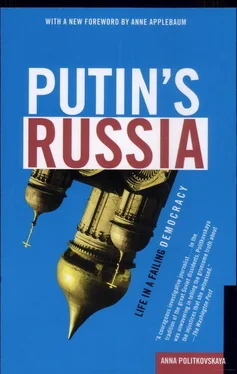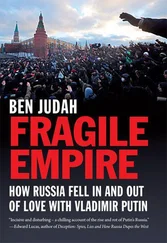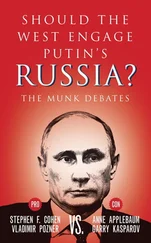Nor was he “on the southwest outskirts” of Grozny. On February 19, while helping the battalion’s intelligence unit escape an ambush and “covering his comrades’ retreat” from the village of Ushkaloy, Itum-Kalin District (according to the citation nominating him for the Order of Valor), Lieutenant Levurda was mortally wounded and died of “massive hemorrhaging following multiple bullet wounds.”
So Pavel Levurda died in Ushkaloy, where the fighting was at its fiercest—a desperate partisan war in highland forests, on narrow paths. But where was Pavel’s body? The family never received a coffin containing Nina Levurda’s son for burial. His remains, she discovered, had been lost by the state he had tried with such desperate loyalty to serve.
Nina Levurda then took on the tasks of military prosecutor and investigating officer. She found out that on February 19, the official date of her son’s death, the comrades whose retreat he was covering did indeed get away, and simply abandoned Pavel, along with six other soldiers who had saved them, by breaking through the ambush at the scene of heavy fighting. Most of the soldiers left behind had been wounded but were still alive. They shouted for help, begged not to be abandoned, as villagers later testified. They bandaged some of the wounded themselves, but could do no more. There is no hospital in Ushkaloy, no doctor, not even a nurse.
Pavel Levurda had been deserted on the battlefield and then forgotten. Nobody cared that his body was lying there, or that he had a family awaiting his return. What happened after his death is typical of the army, a disgraceful episode that stands for an ethos in which a human is nothing, in which no one watches over the troops, and there is no sense of responsibility toward the families.
The military only remembered Pavel Levurda on February 24, when, according to information provided by general headquarters in Chechnya, Ushkaloy was cleared of Chechen fighters and “came under the control” of federal forces. (This explanation was actually presented later, to prove that “there was no objective possibility” of recovering Pavel’s body.)
On February 24, the army collected the bodies of six of the seven soldiers. They couldn’t find Pavel Levurda, so they forgot about him again.
Back home, Pavel’s mother was in a dreadful state. The only communication she had had was Pavel’s letter, which she had received on February 7. The Ministry of Defense’s “hotline” wasn’t much help: talking to the duty officers there was like talking to a computer. “Lieutenant Pavel Petrovich Levurda is not on the list of the dead or missing,” was the invariable reply she received. Nina went back to the “fully updated” hotline over the course of several months: even after she had located Pavel’s remains through her own efforts, even after official notification of his death, she continued to hear the same information.
But to return to the story of Pavel’s body. On May 20, three months after the fighting in Ushkaloy, the village police discovered “the body of a man showing signs of violent death.” However, it was only on July 6, after another one and a half months of Nina’s calls to the hotline and the local army commissariat, that the same police filed the relevant form, “Orientation/Task No. 464,” in response to the ordinary missing-person’s inquiry Nina had registered with her own local police. On July 19 the Ushkaloy report finally reached Bryansk, where Pavel’s family lived. Thus on August 2, Detective Abramochkin, an ordinary police officer, came to see Pavel’s parents.
The only person at home was another Nina, Pavel’s fourteen-year-old niece. Abramochkin asked her some questions regarding the belongings Pavel might have had on him, and was surprised to find he was talking to a soldier’s family. To Abramochkin, what had begun as a routine investigation became something quite different. It was Abramochkin—and not an official from the Ministry of Defense—who came to inform the mother of a hero that her son’s entitlement to all provisions and allowances had been canceled. And it was Abramochkin who was sent to the parents in Bryansk to ask for “the permanent postal address of Army Unit 73881 in which Levurda, P. P. had been serving” so that the Itum-Kalin police could contact the unit’s commanding officer to establish the circumstances relating to the death of a person who, from his mother’s description, appeared to resemble one of their officers. (The quotation is from the official correspondence. It reveals a good deal about the realities of the army and the nature of Putin’s war in the Caucasus.)
Seeing the state the family was in, Abramochkin strongly advised Nina Levurda to go to the main military mortuary in Rostov-on-Don as soon as she could. He had heard that the remains of the unknown soldier from Ushkaloy had been taken there for identification by Colonel Vladimir Shcherbakov, director of the 124th Military Forensic Medical Laboratory and a well-known and respected man. Shcherbakov, it should be noted, does this work not at the behest of the army but because his heart tells him it is the right thing to do. Abramochkin also advised Nina not to expect too much, because, as we say, “anything can happen in Russia,” where mix-ups involving dead bodies are only too common. In the meantime, the Bryansk Committee of Soldiers’ Mothers was helping with the Levurda saga, and it was only through its good offices and the efforts of Abramochkin that the elite Fifteenth Guards Regiment and the even more elite Taman Guards Division finally twigged that the seventh body just might be that of Pavel Levurda.
“We arrived in Rostov on August 20,” Nina said. “I went straight to the laboratory. There was no security at the entrance. I walked in and went into the first autopsy room I found. I saw a severed head on a stand next to an examination table. More precisely, it was a skull. I knew immediately that it was Pavel’s head, even though there were other skulls nearby.”
Is there any way to assess this mother’s distress or compensate the distress her for it? Of course not. Nina was given sedatives after the encounter with her son’s skull, which she had correctly identified. At this moment a representative from Pavel’s unit came rushing in to see her; the commanding officer had received a telegram from Abramochkin and then sent someone to Rostov to take care of the formalities. This representative soldier showed Nina a letter. She looked at it and, despite the sedatives she had just taken, she fainted. She already knew the news contained in the letter; the army’s callousness, however, was a fresh blow. In the letter, the acting commanding officer of Army Unit 73881 and the unit’s chief of staff requested that “Citizens Levurda” be informed that “their son, while on a military mission, true to his military oath, showing devotion and courage, has died in battle.” The unit was trying to cover the tracks of its forgetfulness.
When Nina recovered, she read the notice more carefully. There was no indication of when her son had died.
“Well, what about the date?” Nina asked the soldier.
“Write it in yourself, whatever you like,” he replied.
“What do you mean, write it in?” Nina shouted. “The day Pasha was born is his date of birth. Surely I have a right to know the date of his death!”
The soldier shrugged and went on to hand her a further document: an order to “remove Lieutenant Levurda from the list of members of the Regiment.” This paper, too, bore no date and indicated no reason for removing Pavel’s name, but it did have various stamps and signatures at the bottom. Again, with the artless gaze of a child, the unit’s representative asked Nina to fill in the blanks herself and hand the paper in, when she got home, to the local army commissariat so that Pavel could be removed from the register.
Читать дальше





![Stephan Orth - Behind Putin's Curtain - Friendships and Misadventures Inside Russia [aka Couchsurfing in Russia]](/books/415210/stephan-orth-behind-putin-s-curtain-friendships-a-thumb.webp)






